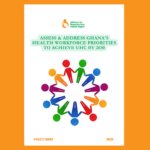Abstinence is the act or practice of abstaining especially from engagement in sexual intercourse, or consumption of intoxicating beverages. Concerning adolescents, practicing abstinence requires high motivation, dedication, and a deep understanding from both partners. The advantages of abstinence cannot be emphasized enough, as it is the only birth control method that has a 100% success rate and prevents sexually transmitted infections like HIV/AIDS. According to the Ghana Health Service District Health Information Management Health System, in 2022, Ghana recorded 542,131 pregnancies among adolescent girls aged 15-19 years and 13,444 pregnancies amongst girls between 10-14 years.
Abstinence Categories
There are two categories of young people who choose to abstain; primary and secondary abstainers. Primary abstainers are adolescents who have not had any sexual experience, while secondary abstainers are adolescents who are sexually experienced but have decided to avoid further sexual activity. It is of the utmost importance that sexually active young people, be educated on safe sex practices including, the use of contraceptives to prevent unintended pregnancies and STIs/HIV infection.
Benefits of Abstinence
The abstinence of sex has many advantages for adolescents. Focusing on things important to you, like family and friends, is just one of the many benefits of choosing to abstain from sexual activity. Abstinence encourages self-respect and enables adolescents to stand up for what is morally right. Adolescents abstaining from sex drastically reduces the risks that come with sexual activity, such as unwanted pregnancies and STIs like HIV.
Moreover, abstinence allows young people to focus on building authentic emotional connections with their partners instead of focusing on only the physical aspect, this is one way for adolescents to have healthy and long-lasting relationships. According to a report by the UNFPA, abstinence is the only method that will avoid pregnancy, STIs, and HIV/AIDS 100%.
Why Choose Abstinence
Choosing abstinence provides adolescents with the ability to prioritize their academic performance and psychological well-being. By abstaining from sexual activities, adolescents can avoid the risk of unintended pregnancies and can decrease exposure to sexually transmitted infections. Abstaining from sexual intercourse reduces the risk of reproductive tract infections. Sexual abstinence decreases the risk of developing this infection.
Practicing Abstinence involves:
- Clear Reasoning: Set clear and realistic boundaries as to how much sexual activity you are willing to allow, if any.
- Avoid Substances: Steer clear of intoxicating substances that could cloud your judgement and influence your decision-making.
- Plan Wisely: Avoid situations where remaining abstinent may be difficult, hereby maintaining dedication.
- Look for Support: Interact with reliable individuals and support groups, to discuss setbacks and improvements.
The Success of Abstinence
Abstinence remains the only birth control method that has a 100% success rate and prevents both pregnancy and STIs. Nevertheless, it requires a constant commitment to avoid the risks.
Conclusion
Abstinence, despite its difficulties, can be very rewarding for adolescents as the probability of contracting sexually transmitted infections becomes very low. Since it is not one of the most common methods of birth control, its benefits are inarguable. Ultimately, sexual education should be highly prioritized in communities, to help adolescents understand the importance of safe sex and birth control methods.
About the Writer
Keifa Agyemang-Badu, age 16, is a student of East Airport International School. He is in Grade 11. His favorite subjects are English Language, History and Business. He enjoys reading, writing, watching and playing basketball. He is a Christian and attends The Eagle Center for International Ministries. He aspires to become a business man and professional basketball player.



